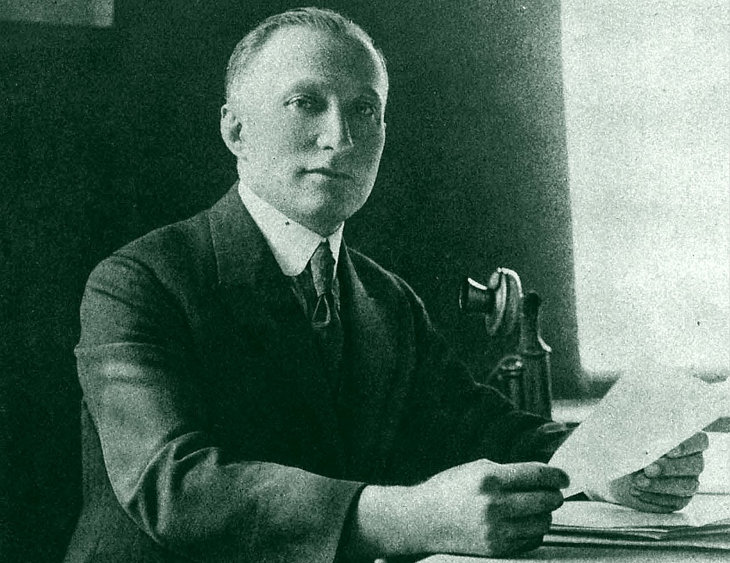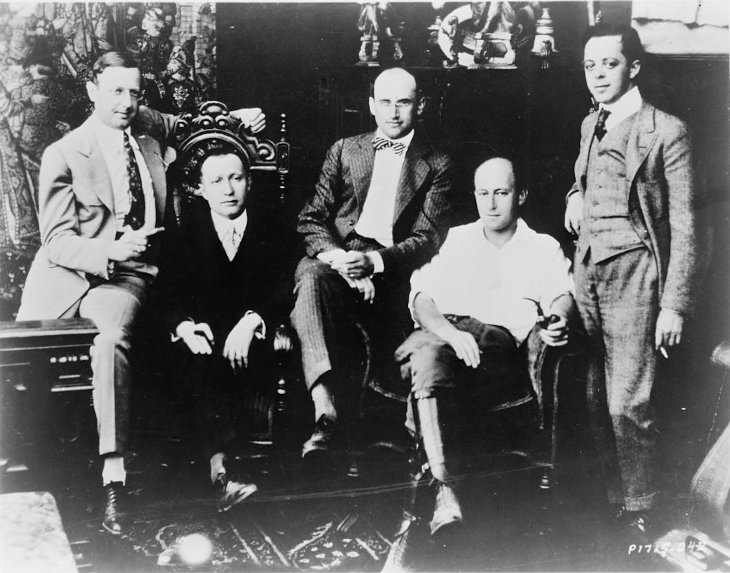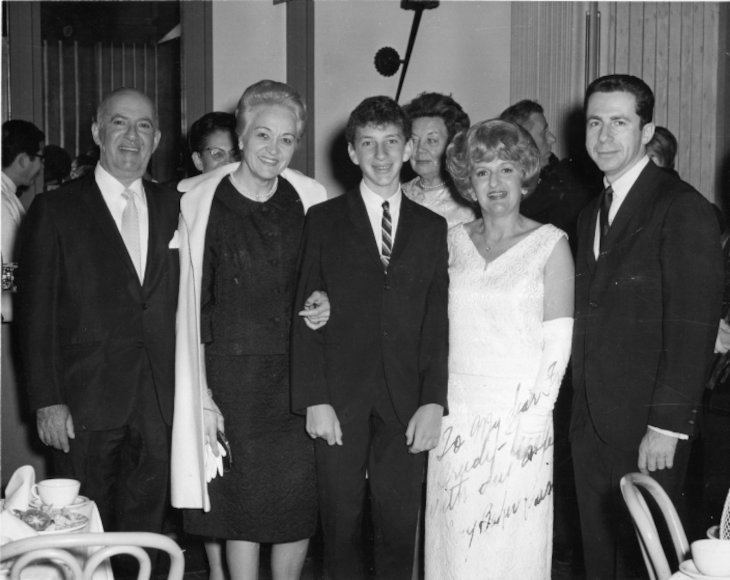 An Open Letter to University Presidents
An Open Letter to University Presidents


6 min read
In the wake of the Academy Museum scandal – where Jews were excluded from the exhibition – a new film delves into early Jewish immigrants’ impact on the industry.
On September 25, 2021, the Academy Museum of Motion Pictures, which catalogues the history of film, opened in Los Angeles. Haim Saban, a Jew who served in the IDF and produced The Power Rangers, gave a landmark donation of $50 million to ensure the project’s completion. Many of the early founders of Hollywood – the writers, directors, producers, and actors – were Jewish immigrants. But the Academy Museum erased Jews from the picture.
This caused a huge controversy, prompting the museum, which called itself “radically inclusive,” to add an exhibit on the historic Jews of Hollywood. It also inspired James Forsher, a filmmaker, to make A Paramount Story, a documentary on one of these early Hollywood pioneers, Adolph Zukor, a founder of Paramount Pictures.
Through the film, Forsher hopes to bring visibility to Zukor’s life, dispel antisemitic myths, and show audiences the monumental – and positive – impact Jews had on Hollywood.
Adolph Zucker, an Ashkenazi Jew, was born Ricse, Hungary, in 1873, and became an orphan when he was seven. He immigrated from the Austro-Hungarian Empire in 1888 to the United States when he was 15 years old, and soon got a job sweeping the floors at a fur store for $2 a week. In the 1890s, he discovered moving pictures, and was immediately fascinated by them.
 Adolf Zukor
Adolf Zukor
Zukor was a hard worker; he got into the penny-arcade business, and then he operated a chain of movie theaters with Marcus Loew, whom he had met through the fur industry. They formed Loew's Enterprises, but Zukor became increasingly frustrated with the hurdles he had to overcome to get films to show in his theaters. He knew what he had to do: produce the movies himself.
In 1912, he became the exclusive distributor of a film called Queen Elizabeth, which was a huge financial success. He then formed the “Famous Players,” where he would take Broadway plays, with their original actors and actresses, and make them into movies. His films included The Prisoner of Zenda and The Count of Monte Cristo.
Building upon his achievements, Zukor co-founded The Paramount Pictures Corporation – the first company in Hollywood to do production, distribution, and exhibition. He signed and paid large salaries to some of the biggest actors of the day, including Mary Pickford, Douglas Fairbanks, and Rudolph Valentino. In the 1920s, Paramount was putting out 60 feature films per year, and Zukor owned the Publix Theatres Corporation, a chain of theaters with nearly 2,000 locations.
 Members of the Famous Players-Lasky Corporation: left to right: Jesse L. Lasky, Adolph Zukor, Samuel Goldwyn, Cecil B. DeMlle and Al Kaufman
Members of the Famous Players-Lasky Corporation: left to right: Jesse L. Lasky, Adolph Zukor, Samuel Goldwyn, Cecil B. DeMlle and Al Kaufman
Though Zukor revolutionized the film industry, neither he nor his fellow Jewish moguls were shielded from antisemitism.
According to Forsher, there were so many Jews were in Hollywood because they were not included in other industries.
“They were excluded from most other businesses,” he said. “Film was a brand new industry that they could get involved in.”
Antisemitism prevailed in the U.S. and in the film industry as well. In the 1930s, a flyer was spread around featuring a gentile girl and a stereotypical image of a hook-nosed Jew that read, “Christian Vigilantes Arise! Buy Gentile; Employ Gentile; Vote Gentile." It goes on, “Boycott the Movies! Hollywood is the Sodom and Gomorrah where international Jewry controls vice, dope, gambling -- where young gentile girls are raped by Jewish producers, directors, casting directors who go unpunished.”
 Antisemitic flyer in Hollywood
Antisemitic flyer in Hollywood
Zukor was also working in a time when Henry Ford was republishing the antisemitic “Protocols of the Elders of Zion” and writing about the dangers of “international Jewry” in his publications.
“Antisemitism is nothing new, and what is happening today looks very much like it looked in the early decades of the 20th century,” Forsher said.
When Hitler was rising to power in Europe, he also sent Nazis to Hollywood to convince filmmakers to include German propaganda – and they were successful at this. There was a plot to kill prominent Hollywood Jews like Louis B. Mayer and Al Jolson as well.
Later on, during the time of the “Red Scare,” in which Americans were worried about communism taking over, some politicians, including John Rankin (D-Miss.), subpoenaed 17 producers, screenwriters, and directors to appear before the House and answer the question, “Are you now or have you ever been a member of the Communist party?” Ten of them refused to answer, facing consequences like sentenced to up to a year of jail. Six out of these 10 were Jewish, and Rankin, a known antisemite, referred to Jewish actors Danny Kaye and Edward G. Robinson by their birth names, which were David Daniel Kaminsky and Emmanuel Goldenberg. Even when Jews hoped to assimilate, they were “outed” and hated by antisemites.
While Forsher doesn’t believe that ‘the Academy Museum’s omission of Jews was antisemitic, he believes other recent events – like Dave Chappelle’s controversial “Saturday Night Live” monologue where he repeated tropes like Jews run Hollywood – could be qualified as such.
“Jews survived in Hollywood by just hiding and hoping nobody recognized them as Jews,” he said. “I still think that mentality exists to a certain extent.”
Zukor, an orphaned immigrant, overcame the odds, leaving poverty behind, fending off antisemitism, and becoming one of the most important figures in Hollywood history.
Eventually, he became chairman of Paramount in the 1930 and then had chairman emeritus status up until his death in 1976 at the age of 103.
For Forsher, translating Zukor’s story to the screen was a personal one. Forsher’s family also came from Europe and struggled the same way Zukor did. His mother was also in the movie business – she was Elvis’ private secretary as well as a publicity coordinator in Hollywood.
When Forsher saw an interview with Zukor, who was then 94, he became inspired to start making films himself. He ended up creating a number of movies about historical figures, such as Conrad Hilton: Insight into a Giant and Hollywood Uncensored.
 Producer James Forsher (center) at his Bar Mitzvah. To his right are his mother and Adolph Zukor 2nd.
Producer James Forsher (center) at his Bar Mitzvah. To his right are his mother and Adolph Zukor 2nd.
Telling Zukor’s story, and showcasing the pioneering moguls who fought antisemitism, was one of Forsher’s life goals – one that he is proud to have accomplished.
“The film portrays the moguls not just as sneaky, tough, and ruthless, but as visionaries that fought for freedom of content in films,” said Forsher. “They had some very tough opponents to fight with.”
